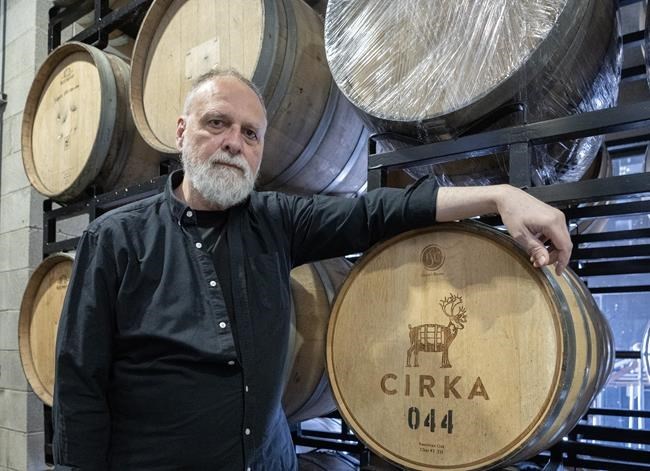MONTREAL — The number of microdistilleries in Quebec has boomed in the last decade, growing from less than a dozen to about 70.
But a decision by Quebec's liquor corporation to cull up to 200 homegrown productsfrom its stores is a sign of the growing pains felt by an industry struggling with strong competition, onerous regulations and a tough economy, distillers say.
The Société des alcools du Québec, or SAQ, announced last week that it plans to withdraw 150 to 200 lower-selling Quebec spirits from store shelves by winter 2025. The SAQ currently stocks over 600 Quebec spirits.
"The space they currently occupy on shelves will be freed up for products that customers demand but that struggle to find room in an overly large assortment," the provincial Crown corporation said in an email. It added it was working with the Union québécoise des microdistilleries, a group representing distillers, to come up with new rules in the coming months.
Paul Cirka, the president of Montreal-based Cirka distilleries, said the situation at the SAQ is the result of an industry that has expanded rapidly, without more available shelf space and with almost no other opportunities to sell. The result, he said, is some producers "throwing products" at the SAQ, which he said indiscriminately put them all on the shelves to see what resonated.
"To some degree the SAQ created this problem, and now they don't know how to manage it because they have no clear creative or management outlook that looks at a solution," he said in a phone interview. He fears the SAQ lacks vision on what products to stock and where, which could result in some promising products being cut because they haven't gotten enough visibility or advertising.
And even if distilleries sell their products directly to consumers from their own premises — the only other way allowed — they still have to remit about half the sale price to the SAQ, not including taxes. He said that amount is much higher than what other provinces collect from small distilleries.
"If they are pulling products off of retail shelves, and those are still viable products that you can sell out of your distillery, there's no reason that the SAQ should be given the markup," said Cirka, whose distillery produces gin, whisky and vodka that is sold by the SAQ.
Samuel Gaudette, co-founder of Comont distillery in Quebec’s Eastern Townships, said the SAQ made a mistake in not regulating what spirits it stocks from the beginning.
However, he said that suddenly reducing products, without allowing producers another outlet, “will definitely suffocate smaller players and especially those just starting out.” He said it would also stifle creativity.
“By wanting to remove more niche products that necessarily have fewer sales, the message they send to distilleries is simple: they are looking for mass products to maximize sales and satisfy the general public,” Gaudette wrote in an email.
Joelle Bolduc, the co-owner of les Esprits Tordus micro-distillery in l’Assomption, north of Montreal, says she's cautiously optimistic that SAQ's plan to be more discerning about what it carries might create more room for new and innovative products.
"There are distilleries that offer six different kinds of gin," she said. "Do we really need so many gins from one distillery? Beyond that, do we really need 300 types of Quebec gins?"
But she says adjusting the SAQ's offerings won't be enough to solve the industry's problems.
She notes that several well-known distilleries have closed down or filed for bankruptcy protection in the last year. She says the COVID-19 pandemic, an economic downturn and an "explosion" in the number of distilleries haven't helped, but neither has Quebec's restrictive sales model.
She notes that she has to pay half her sales to the SAQ even though they don't stock her bottles.
"Our products are sold only at the distillery, but I still have to send the SAQ 52 per cent of the price of my bottle, even if they don't offer me a single service in marketing it," she said.
Bolduc and her husband, who have been in business for two years, produce an eau-de-vie, similar to a brandy, made with grapes, elderflower and raspberries they grow themselves, as well as a whisky-like spirit made from leftover beer they collect from local breweries.
She'd like to get her products on liquor store shelves, but that would require considerably scaling up their operation to create the volume the Crown corporation requires.
"Our business model is that we are a small line in an agricultural environment, we want to remain on a human scale," she said. "A business model like that is very difficult in the current environment."
All three distillers say the easiest way for the province to help small distilleries -- and free up shelf space at the SAQ -- would be to give distillers more freedom to sell their products, including to restaurants, at farmers markets and directly to customers online. They also believe distillers should get a break on the amount they have to remit to the SAQ for bottles sold without the corporation's help.
The SAQ says it is evaluating the possibility of putting in place "alternative channels" for sales as part of its changes, but did not specify what they might be.
This report by The Canadian Press was first published April 28, 2024.
Morgan Lowrie, The Canadian Press




